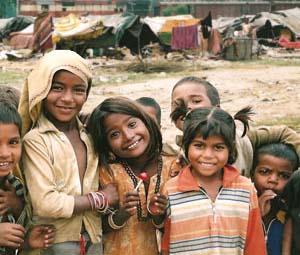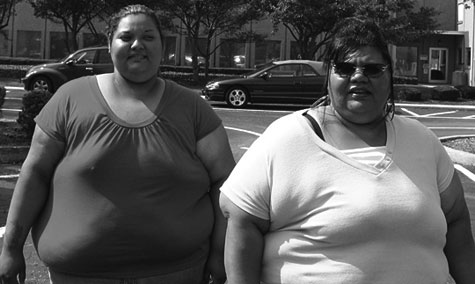Providence College Student — Are Tax Dollars Subsidizing Obesity?
With college students forced to worry about food money, getting fat may be the least of their worries (beyond the dreaded Freshman 15 pounds).
However, Providence College Student Christine Rousselle spends some time considering American obesity and its cause.
Obesity is reaching epidemic levels in the United States, especially among poorer populations. Children living in poverty are 1.7 times as obese as their peers, and there’s an inverse relationship between wages and body mass index (BMI), which is a measurement of a healthy weight. Basically, the poorer you are, the fatter you are. How is this possible? This defies logic. When one thinks “poor,” they usually think of food insecurity and hunger, not obesity.
For instance, here’s a picture of children who live in a slum in India:
They’re among the world’s poorest. They live in tents on the streets without plumbing, electricity, or any modern comfort that Americans are used to. Their situation is tragic and sad.This picture is the fourth result on Google Images result when the term “Poor Americans” is entered:
This is a picture of Angelica Hernandez and Gloria Nunez, who live in Ohio in a subsidized housing complex. They are both unemployed and live off of SNAP (food stamps) and other government benefits. Nunez and Hernandez were profiled in an NPR article about the rough economy in 2008.
…What most people don’t realize is that with an EBT card with SNAP benefits, a person can buy approximately 99% of the food or beverage items in a grocery store. While SNAP cannot be spent on liquor, beer, and most hot prepared food items, (although some states allow EBT cards to be used at fast food restaurants) everything else is fair game and can be purchased using SNAP funds. The “everything else” category includes (among traditional nutritious items like vegetables, fruit, and bread): gum, candy bars, soda, energy drinks, prepared cakes from the bakery, lobsters, bacon wrapped filets, ice cream, donuts, cupcakes, etc.
…American taxpayers should not have to subsidize the obesity of the lower class under the guise of a nutritional program meant to prevent starvation. If a person wants Cheetos or Mountain Dew badly enough, they can use their own money for it. SNAP is not designed or intended to cover the entire food budget for a person (hence the starting term of “supplemental”), and it should cover the basics and that’s it. Soda, gum, and candy bars are not “basics.”
Rousselle concludes: “I want all Americans to be healthy. Our obesity rates are shocking and disturbing. A good step forward would be ensuring that the only items that can be bought with SNAP truly fulfill the mission of the program—ensuring nutrition.”








